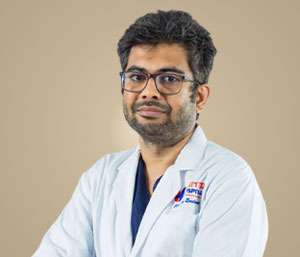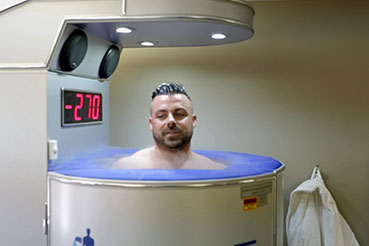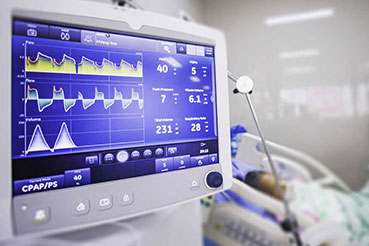The Department of Anaesthesiology, Critical Care and Pain Medicine at United Hospital is committed to providing state of the art facilities for anaesthesia, critical care and pain management, along with the finest life support modalities to help terminally ill patients, suffering from severe medical illness or traumatic injuries. The department is manned by a team of expert anesthesiologists who provide the best possible anaesthesia techniques to make the most complex surgeries safe and pain free. The department also has highly qualified critical care specialists, pulmonologists, dietician, physiotherapist & dedicated nurses; who constantly strive to offer unparalleled care to the patients using a personalized, yet multidisciplinary approach. Nurses are assigned to every patient for round the clock care, catering to all their needs. The team adheres to the finest quality of patient care and is backed by infrastructure and technology that help to ensure unparalleled outcomes in the most complex cases.
Anaesthesia
What is Anaesthesia?
Anaesthesia refers to the controlled loss of sensation, induced artificially before surgical intervention, to make sure that the patient does not feel any pain or discomfort. It is one of the greatest discoveries of modern medicine, that has made it possible to perform the most complex and invasive procedures and treat conditions that were earlier considered to be incurable. At United Hospital, we have 24/7 available in-house qualified anaesthesiologists backed by state of the art operating units, ICUs and advanced monitoring modalities.
What are the types of anaesthesia?
Anaesthesia is broadly classified into 3 different types. These are:
- Regional anaesthesia - Regional anaesthesia helps to numb a specific area of the body, such as the limbs &/or abdomen. The patient may either be sedated or awake, however, you will not feel any pain or discomfort. Ex: Spinal anaesthesia, Epidural anaesthesia, Nerve blocks, etc
- General anaesthesia - As the name suggests, it has a general impact, which means that it affects the whole body and leads to unconsciousness. It temporarily stops the patient from- being aware, forming memories & feeling pain. General anaesthesia is given in almost all major surgeries, especially those involving the heart, brain, liver, intestines and kidneys.
- Local anaesthesia - Local anaesthesia is used locally, to numb a very small area of the body. It is commonly used in tooth extraction or when someone needs stitches.
When & Where is Anaesthesia administered?
Anaesthesia is usually administered a few minutes prior to surgery or other medical procedures. It is commonly provided in the operation theatres in case of major surgeries.
Is Anaesthesia safe?
Anaesthesia when administered by a trained & qualified doctor, the Anaesthesiologist; is totally safe. Each patient is assessed before surgery during the Pre-Anaesthesia Check-Up to assess the patient specific risk factors taking into account the co-morbid conditions, blood tests, etc & anaesthesia techniques suitable for the patient are decided so as to provide a safe & pain free surgical experience. Monitoring of vital parameters is done throughout the surgical procedure using state of the art monitors.
Critical care
What is critical care?
It refers to the care that is given to patients who are severely ill. This involves specialized treatments and continuous monitoring of the patients to stabilize them, prevent further damage and help them manage other symptoms.
Conditions that call for the need of critical care:
- Severe burns
- COVID-19 related complications
- Heart attack
- Heart failure
- Kidney failure
- Respiratory failure
- Severe infections
- Severe bleeding
- Chronic infections
- Traumatic injuries
- Shock
- Stroke
Areas of expertise:
- Ventilators
- Securing invasive lines like arterial lines & central lines
- Dialysis
- Introduction of feeding tubes
- IV administration of critical medicines
- Monitoring of vital parameters with modern state of the art monitors
- Oxygen therapy
- Introduction of tracheostomy tubes
Pain medicine
What is pain medicine?
Pain medicine primarily focuses on the management of pain through various modalities like medication and therapy. Chronic pain can be debilitating and can drastically impact the quality of the patient’s life (Ex: cancer pain, arthritis, neuralgia). Pain medicine focuses on the medical & interventional management of the same to help you lead a pain-free life.
Areas of expertise:
- Nerve block injections
- Steroid injections for joints, tendons
- Epidural steroid injections
- PRP injections
- Physiotherapy
- Narcotic pain medication
- Cryotherapy
- Radio frequency ablation
- Spinal cord stimulation
- Trigger point injection
- Spinal drug delivery system
- Patient-controlled analgesia
- Electrothermal therapy
- Bioelectric therapy

 (+91) 7022316664
(+91) 7022316664  Emergency: (+91) 80 4566 6616
Emergency: (+91) 80 4566 6616 






.jpg)









